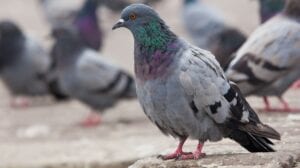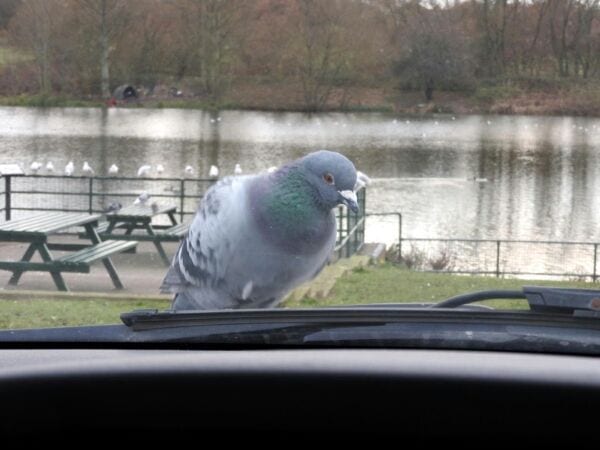
by Pigeon Patrol | May 30, 2023 | history of pigeons, MBCA, pet bird, Pigeon Control, Pigeon Droppings, Pigeon Patrol's Services, Pigeon Predators
In the span of a few weeks, Erica Richards has been transformed from a vibrant 23-year-old woman who loved nature to a person battling for her life.
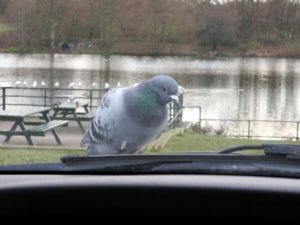
In early January, the Fredericton woman contracted a potentially fatal condition called cryptococcal meningitis, a fungal disease carried in the feces of pigeons.
The debilitating illness attacks the spine and brain, causing severe swelling. It left her confined to a hospital bed in a state of delirium for weeks.
But the most devastating side effect is that Ms. Richards is now blind.
“Be aware of this disease. It could kill a child in a heartbeat,” Ms. Richards said in an interview from her hospital bed.
“It could kill a senior in a heartbeat without you even having to worry about the symptoms. It comes on that fast. If you don’t realize the symptoms, it could kill you, too.”
Her emotional warning comes on the heels of city council’s approval earlier this month of a recommendation that it toughen its animal control bylaw to allow for fines for feeding pigeons. Once the amendment is drafted and declared law, it will give the city’s bylaw enforcement officers the power to ticket and fine offenders.
Ms. Richards said she decided to go public about her illness after learning about a recent newspaper story about a problem with pigeon poop in the city.
“Please don’t feed the pigeons,” she said. “Try to shoo them away if you see them. … It (the disease) is horrible. The pain that you get from this disease is crippling.
“The after-effects are with you for life and you just can’t stop thinking about it. I just want other people to know and try to stay away from pigeons.”
Oddly enough, Ms. Richards said she has no recollection of ever being anywhere near pigeons.
“I am still wondering to this day where I got it,” she said. “I could have stepped in it and brought it into the home. I just don’t know.”
Ms. Richards said the symptoms started with a migraine headache that wouldn’t go away. She was admitted to hospital on Feb. 10 after many days of intense head pain. Shortly after, she went into a coma-like state.
“When I woke up I thought I had a mask over my eyes, but I was wrong. I was blind. I was recently told that I will be blind for the rest of my life. This is a tough thing for a 23-year-old to go through. … My world crumbled around me.”
Ms. Richards said the odds of surviving the disease are 50-50.
“However, I managed to make it through,” she said, battling tears. “I don’t know how but I am still here, and I am glad because I get to warn everyone else of this.”
Cristin Muecke, the Health Department’s regional medical officer, confirmed the disease is often associated with pigeon droppings. She said the illness can’t be spread person to person and is more common with someone who has immune problems.
Ms. Richards, however, said she has never had a problem with her immune system and that’s what’s so puzzling about contracting the affliction.
“I do not want anyone else to suffer this agonizing disease and I ask anyone who is feeding pigeons to stop,” she said. “It’s not just a matter of keeping your neighbourhood clean … it’s a matter of keeping people healthy.”
Source
Pigeon Patrol Products & Services is the leading manufacturer and distributor or bird deterrent (control) products in Canada. Pigeon Patrol products have solved pest bird problems in industrial, commercial, and residential settings since 2000, by using safe and humane bird
deterrents with only bird and animal friendly solutions. At Pigeon Patrol, we manufacture and offer a variety of bird deterrents, ranging from Ultra-flex Bird Spikes with UV protection, Bird Netting, 4-S Bird Gel and the best Ultrasonic and audible sound devices on the market today.
Voted Best Canadian wholesaler for Bird Deterrent products ten years in a row.
Contact us at 1 877-4-NO-BIRD,(604) 585-9279 or visit our website at www.pigeonpatrol.ca
Pigeon/Pigeon Patrol / Pigeons Roosing / Vancouver Pigeon Control / Bird Spikes / Bird Control / Bird Deterrent / PIgeon Deterrent / Surrey Pigeon Control / Pest / Seagull deterrent / Vancouver Pigeon Blog / Birds Inside Home / Pigeons in the cities / Ice Pigeons / What to do about pigeons / sparrows, Damage by Sparrows, How to Keep Raccoons Away, Why Are Raccoons Considered Pests / De-fence / Pigeon Nesting / Bird Droppings / Pigeon Dropping / woodpecker control / Professional Bird Control Company / Keep The Birds Away / Birds/rats/seagull/pigeon/woodpecker/dove/sparrow/pidgeon control/pidgeon problem/pidgeon control/flying rats/pigeon problems/ bird netting/bird gel/bird spray/bird nails/bird guard
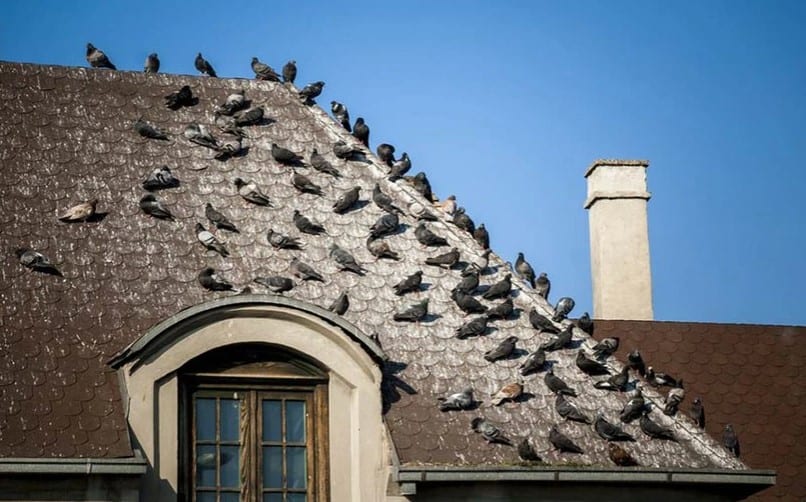
by Pigeon Patrol | May 9, 2023 | history of pigeons, MBCA, pet bird, Pigeon Control, Pigeon Droppings, Pigeon Patrol's Services
“Everybody has a hobby, right? Some have cats, some have dogs. I have pigeons.”
Kulwant Dulay says he’s lived in the District of North Vancouver for 25 years and, for most of them, he’s kept homing pigeons on his property in a coop in the backyard, without ruffling any feathers.
But that changed three years ago when he bought a new house in Lynn Valley. Within a few weeks, his next door neighbour began complaining about the birds.
“In my other house in North Vancouver, everyone loved pigeons. They were flying around no problem. My second, third week I moved in, she started complaining,” he said.
On Monday evening, North Vancouver District council formally approved a new bylaw that would make it illegal to own pigeons, repealing a 1971 law allowing them.
The discussion was brief, but council discussed the motion in detail the week before.
There, staff told them they could only find one person in the district who had pigeons and only one person who had recently filed a complaint. It was proposed the new law wouldn’t come into effect until May 2020 to allow a transition period.
The vote both weeks passed 4-2. Councillor Betty Forbes recused herself.
“I have been involved in a situation like this,” she told council before one of the discussions.
That wasn’t exactly accurate. Because, while it was never said in that meeting, Forbes was the next door neighbour who complained.
“I’ve spent lots of money fixing my backyard. I try and keep it as prim and proper as I can. I invest in it every year. And now I get to sit on the back deck and entertain and look at a pigeon coop.”
In May 2017, the district held a public hearing for a proposed bylaw allowing backyard chicken coops. Betty Forbes, then just a member of the public, made her first appearance in front of council.
She wanted to talk about “a situation” that had arisen.
“A new neighbour moved in,” said Forbes. The coop was “ramshackle” and “an eyesore.” And, she warned, it would harm the value of her property.
“I know it sounds pretty cold,” she told council, “but there is an impact to having coops in backyards to properties next door to that. I’ve spoken with a couple of real estate agents, and they’ve told me it will definitely have an effect.”
Council passed the chicken coop bylaw.
Over the next year, Forbes sent a number of letters and phone calls to district staff about Dulay’s pigeons. She also sent a letter to then-mayor Richard Walton, saying that Dulay “allows his pigeons to fly and perch on neighbours properties without any control or supervision.”
In the summer of 2018, staff investigated and took away six of Dulay’s pigeons. A total of 15 remain, trained to fly back and forth from their large coop in Dulay’s backyard, a few feet from the fence surrounding his and Forbes’ homes.
Dulay says he applied for a permit from the district but never got one. He also claims he’s worked to be a good neighbour after Forbes’ complaint, but Forbes hasn’t spoken to him since.
“My neighbourhood is nice … only one person complains,” he said.
Meanwhile, Forbes started attending council more often, ran for office herself and was elected on Oct. 20 last year.
That’s the point where her situation with Dulay and his pigeons goes from a feud between neighbours to the political arena — and puts Forbes’ communications with district staff and councillors under the microscope.
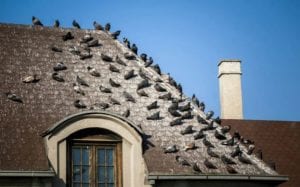
Conflict of interest rules
In July 2019, Coun. Lisa Muri brought forward a motion that asked staff to explore changing the district’s decade-old pigeon bylaw, beginning the process that ended on Monday evening.
“This is a very old archaic bylaw,” she said.
“Why do we need to allow homing pigeons to be released? I am not allowed to release my dogs. They have to be leashed … so, I would ask why would we allow pigeons?”
Forbes also recused herself from that discussion, as mandated under the conflict of interest section in B.C.’s Community Charter.
It states that a councillor with a “direct or indirect pecuniary interest in a matter” must not “attempt in any way, whether before, during or after such a meeting, to influence the voting on any question,” and that they must not “attempt to influence in any way a decision, recommendation or other action to be made or taken … by an officer or an employee of the municipality.”
FOI documents show communication
According to Freedom of Information documents provided to CBC News, after Forbes was elected — but before she was officially sworn in — she sent an email to the city’s chief planning and permitting officer, complaining about the situation and asking for action.
“The discussion and explanations for how this situation has been handled in the last 1 1/2 years were not reasonable nor acceptable,” she wrote.
And from April to June, Muri and Forbes had three email discussions where the subject line read “Pigeons,” “Repeal of the pigeon bylaw” and “Keeping of Pigeons Bylaw.”
CBC News asked Forbes questions about her letter to staff after the election, and her emails with Coun. Muri, but she did not respond. CBC News also asked Muri about the bylaw and her emails to Forbes, and she declined comment.
Mathew Bond was one of two councillors who voted against the initial motion last week. He says the bylaw isn’t an appropriate use of the district’s time.
“We’re in the middle of a regional housing crisis and I’m not sure how the pigeon bylaw got to the top of the agenda,” he said.
“Generally, if there’s one complaint, that’s what our bylaws are for and that’s why we have bylaw enforcement.”
Dulay is still hopeful he’ll be able to keep his pigeons. And wonders why things went so wrong between him and the councillor.
“She has two dogs, I never complain,” he said.
“Even though they’re always barking.”
Source
Pigeon Patrol Products & Services is the leading manufacturer and distributor or bird deterrent (control) products in Canada. Pigeon Patrol products have solved pest bird problems in industrial, commercial, and residential settings since 2000, by using safe and humane bird
deterrents with only bird and animal friendly solutions. At Pigeon Patrol, we manufacture and offer a variety of bird deterrents, ranging from Ultra-flex Bird Spikes with UV protection, Bird Netting, 4-S Bird Gel and the best Ultrasonic and audible sound devices on the market today.
Voted Best Canadian wholesaler for Bird Deterrent products ten years in a row.
Contact us at 1 877-4-NO-BIRD,(604) 585-9279 or visit our website at www.pigeonpatrol.ca
Pigeon/Pigeon Patrol / Pigeons Roosing / Vancouver Pigeon Control / Bird Spikes / Bird Control / Bird Deterrent / PIgeon Deterrent / Surrey Pigeon Control / Pest / Seagull deterrent / Vancouver Pigeon Blog / Birds Inside Home / Pigeons in the cities / Ice Pigeons / What to do about pigeons / sparrows, Damage by Sparrows, How to Keep Raccoons Away, Why Are Raccoons Considered Pests / De-fence / Pigeon Nesting / Bird Droppings / Pigeon Dropping / woodpecker control / Professional Bird Control Company / Keep The Birds Away / Birds/rats/seagull/pigeon/woodpecker/dove/sparrow/pidgeon control/pidgeon problem/pidgeon control/flying rats/pigeon problems/ bird netting/bird gel/bird spray/bird nails/bird guard
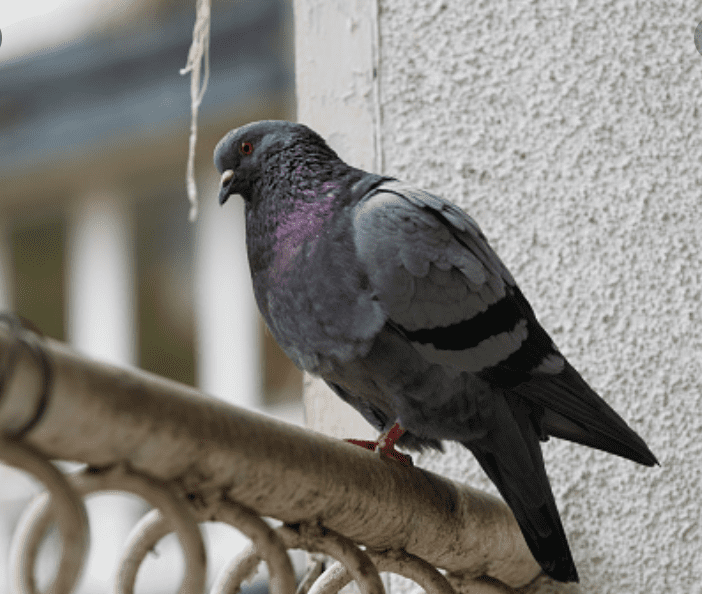
by Pigeon Patrol | May 9, 2023 | history of pigeons, MBCA, pet bird, Pigeon Control, Pigeon Droppings, Pigeon Patrol's Services, Pigeon Predators, Pigeon Spikes
For a month the researchers had traversed slender mountain ridges, crossed and re-crossed rivers that roared through canyons cloaked in tropical forest, and endured bloodthirsty mosquitoes and leeches, all in search of something that probably didn’t exist. They had just hours left for searching before they had to leave Fergusson Island, off the east coast of Papua New Guinea. Expedition co-leader Jordan Boersma reckoned their chance of success was less than 1 percent.
Winded from a climb, he plopped down on a lush hillside to catch his breath and began looking through images on the camera traps he’d just collected, not expecting to find anything. “Suddenly I was confronted with this image of what at that time felt like a mythical creature,” says Boersma, a postdoctoral researcher at the Cornell Lab of Ornithology. “It was, without exaggeration, the most surreal moment of my life.”
The camera’s display was tiny, but there was no mistaking the creature it showed: the Black-naped Pheasant-Pigeon, a species that hasn’t been documented by scientists since it was first described in 1882.
“To find something that’s been gone for that long, that you’re thinking is almost extinct, and then to figure out that it’s not extinct, it feels like finding a unicorn or a Bigfoot,” says John C. Mittermeier, director of the lost birds program at American Bird Conservancy and a co-leader of the eight-member expedition. “It’s extraordinarily unusual.”
The stunning late-September rediscovery could not have happened without guidance from local hunters with intimate knowledge of the island’s forests, the researchers say, demonstrating the invaluable role of Indigenous communities in ongoing efforts to relocate species lost to Western science. With its existence confirmed, the Black-naped Pheasant-Pigeon is almost certainly the most endangered bird in New Guinea, which underscores the urgent need to protect its habitat on Fergusson, a rugged, 555-square-mile island that, while largely undeveloped, faces pressure from logging companies.
“This is a huge discovery,” says Bulisa Iova, an expedition member and acting chief curator of the National Museum and Art Gallery in Papua New Guinea. “I have studied birds for many years, and to be part of this team to discover this lost species is a highlight for me.”
The expedition was part of The Search for Lost Birds, a collaboration between BirdLife International, Re:wild, and American Bird Conservancy, which funded the trip. The initiative aims to rediscover more than 150 avian species that haven’t been declared extinct but also have not been seen for at least a decade.
A chicken-size, ground-dwelling pigeon, the Black-naped Pheasant-Pigeon was among around 20 “lost” birds that have not been documented for more than a century. It’s one of four pheasant-pigeon species found around New Guinea, and lives only on Fergusson Island. (Some authorities consider the four varieties to be subspecies.)
Boersma previously searched for the Black-naped Pheasant-Pigeon in 2019 with Jason Gregg, a conservation biologist and Audubon magazine contributor, and local biologist Doka Nason. While the trio did not find the bird on that trip, they did turn up five bird species not previously known to live on Fergusson, which suggested there were significant gaps in what ornithologists knew about the island’s birdlife. And when they spoke with hunters, they heard reports of a bird whose description could only belong to the pheasant-pigeon.
The researchers returned to Fergusson with a larger team in early September, determined to establish trust and work closely with the island’s Indigenous inhabitants to find the species. Day after day they hiked the steep terrain, stopping to interview locals and sleeping in villages or camping in the forest. Hunters in the first few communities were unfamiliar with the large bird the researchers described. But when the team reached the remote western slope of Mt. Kilkerran, they began to meet villagers who recognized the species and referred to it by the name Auwo.
Finally, in the village of Duda Ununa, a hunter named Augustin Gregory told the researchers where he had seen the bird. He described a call that matched those of New Guinea’s other pheasant-pigeon species, which don’t live on Fergusson. And he showed the team an area, on a ridge 3,200 feet above sea level and covered in thick vegetation, where their motion-triggered camera traps were likely to snap the elusive bird. Nason, who grew up in Papua New Guinea near Fergusson, and who Boersma describes as “the most impressive field biologist I’ve worked with anywhere,” selected a spot and set up the camera.
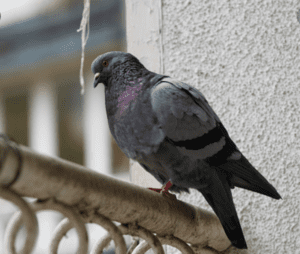
With its vantage limited by dense understory, the site wasn’t a typical one for a camera trap, the scientists say, but the images proved it was the right one. “Unmistakable,” Gregg, an expedition co-leader, says of first seeing the photos. “Tons of mixed emotions. Everything from solemn relief of burden to fist-pumping and screaming.”
Only days later, with time to scroll through everything the traps had captured, did the team realize that another camera had recorded video of a pheasant-pigeon. Given that the images were taken several kilometers apart, they almost certainly show two individuals.
Now that scientists know the Black-naped Pheasant-Pigeon still exists, the focus becomes keeping the critically endangered species from going extinct. As with other once-lost birds, its population is likely very small and seriously imperiled. Logging by international corporations appears to be a growing threat, and introduced predators such as feral cats could take a toll on the pheasant-pigeon as they have on other endemic island birds, according to Gregg. Sustaining the long-lost species will require learning more about its behavior and population status and launching conservation projects to protect its habitat, all with Fergusson Island residents in a leading role.
“Knowing what we know about bird extinction and conservation on islands around the world, we can expect that the combination of logging and introduced species, especially introduced mammals, is going to have an impact,” Gregg says. “This land and the fate of any conservation work that happens on this land is completely up to the communities that live there and own the land.”
Beyond Fergusson Island’s luxuriant forests, the rediscovery of the Black-naped Pheasant-Pigeon raises hopes that future expeditions will turn up other species lost to science but known all along to local experts. “The way this was always going to work is that we just really lean into local knowledge and put our faith in our local partners,” Boersma says. “That’s what delivered this incredible moment for us.”
Source
Pigeon Patrol Products & Services is the leading manufacturer and distributor or bird deterrent (control) products in Canada. Pigeon Patrol products have solved pest bird problems in industrial, commercial, and residential settings since 2000, by using safe and humane bird
deterrents with only bird and animal friendly solutions. At Pigeon Patrol, we manufacture and offer a variety of bird deterrents, ranging from Ultra-flex Bird Spikes with UV protection, Bird Netting, 4-S Bird Gel and the best Ultrasonic and audible sound devices on the market today.
Voted Best Canadian wholesaler for Bird Deterrent products ten years in a row.
Contact us at 1 877-4-NO-BIRD,(604) 585-9279 or visit our website at www.pigeonpatrol.ca
Pigeon/Pigeon Patrol / Pigeons Roosing / Vancouver Pigeon Control / Bird Spikes / Bird Control / Bird Deterrent / PIgeon Deterrent / Surrey Pigeon Control / Pest / Seagull deterrent / Vancouver Pigeon Blog / Birds Inside Home / Pigeons in the cities / Ice Pigeons / What to do about pigeons / sparrows, Damage by Sparrows, How to Keep Raccoons Away, Why Are Raccoons Considered Pests / De-fence / Pigeon Nesting / Bird Droppings / Pigeon Dropping / woodpecker control / Professional Bird Control Company / Keep The Birds Away / Birds/rats/seagull/pigeon/woodpecker/dove/sparrow/pidgeon control/pidgeon problem/pidgeon control/flying rats/pigeon problems/ bird netting/bird gel/bird spray/bird nails/bird guard
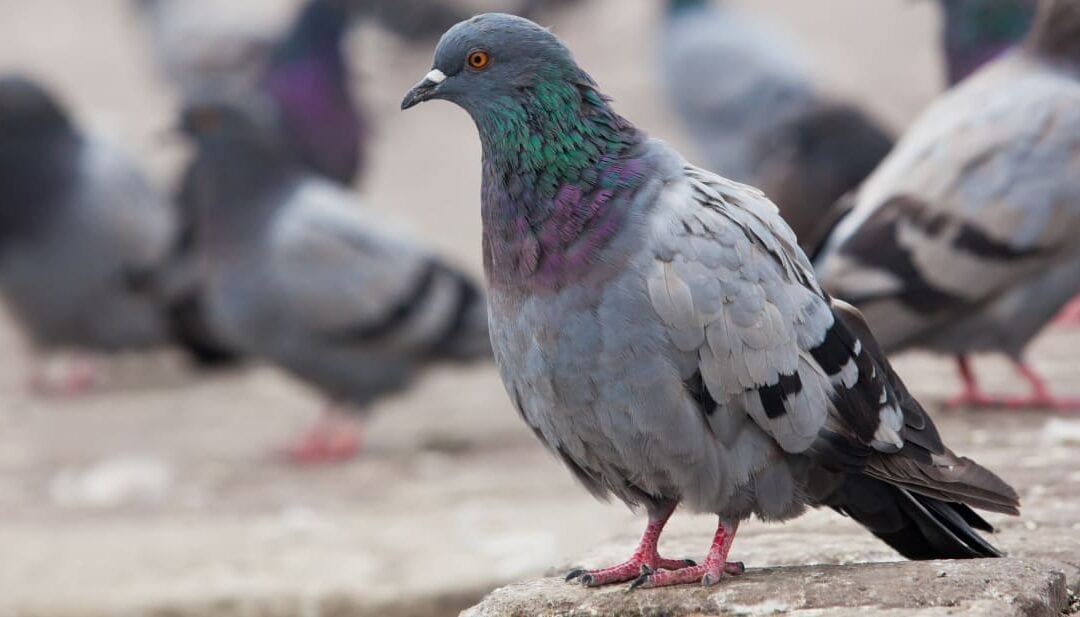
by Pigeon Patrol | May 2, 2023 | history of pigeons, MBCA, pet bird, Pigeon Control, Pigeon Droppings, Pigeon Patrol's Services, Pigeon Predators
Kristyn Wong-Tam doesn’t hate pigeons.
But the councillor for Toronto Centre (Ward 13) has watched constituents fight pigeons for long enough, having fielded numerous complaints over the years from people and businesses forced to buy netting to keep the birds off balconies and window ledges and anything else that can act as a perch or nesting area.
“I do think we’ve reached a tipping point in Toronto,” says the councillor, who has often spotted people feeding pigeons random food in places where people and birds congregate, like Yonge-Dundas Square.
“I’ve seen people take out a loaf of bread and throw it on Bay Street.”
Wong-Tam believes that people are acting out of genuine concern for the birds, or to ensure food doesn’t go to waste. In fact, the discarded food also attracts vermin.
When Toronto council meets this week, Wong-Tam intends to introduce a member’s motion asking that the city examine the possibility of banning feeding pigeons anywhere in the city, in public and private spaces, in order to control the pigeon population.
Currently, the city of Toronto parks bylaw prohibits feeding wildlife or depositing food for wildlife in parks, but there is no such restriction elsewhere. As a result, pigeons crowd public spaces like sidewalks, plazas, boulevards and laneways where they can find discarded food and are also fed by people.
In fact, the lack of enforcement of the bylaw in parks has even rendered some green space unusable, according to Wong-Tam’s motion.
Only two tickets for feeding wildlife in parks were issued in 2020, according to the city.
The lack of control means business is booming for David Szabo, owner of Pigeon Tom, a firm specializing in bird control. Cleaning up after pigeons, and protecting balconies and buildings from pigeons is most of his business.
Nesting pigeons love concrete balconies, and they can quickly coat patio furniture, barbecues and stored bicycles in droppings that are difficult and sometimes impossible to clean effectively.
“It literally drives people crazy because they’re so loud,” says Szabo. “They’re always cooing, especially early in the morning at 6 or 7 a.m.”
Because the birds return to nest in the place where they were born, the situation can quickly spiral out of control, Szabo says. Then there are the people who never go out on their balconies at all.
“In some cases, the person just never went out on the balcony for like five or six years, and it’s so bad you can’t open the door.”
Pigeon experts agree that feeding pigeons people-food, or large quantities of birdseed, isn’t good for the birds or the people who have to live with them. It leads to overpopulation and a buildup of unsightly and corrosive droppings, among other problems.
“People think that they’re feeding the birds, oftentimes they’re feeding the rats,” says pigeon expert Elizabeth Carlen, a post-doctoral research fellow at the Living Earth Collaborative at Washington University in St. Louis.
Carlen has studied pigeon populations from Boston to Washington, D.C.
“I have seen many places where people have dropped birdseed, thinking they are feeding the birds, and right behind it will be a rat burrow.”
Cities, with their proliferation of concrete balconies and windowsills and ledges, are just like the rock cliffs pigeons populate in nature, says Andrew Blechman, author of “Pigeons: The Fascinating Saga of the World’s Most Revered and Reviled Bird.”
“They like our cities because pigeons don’t do trees, they do cliffs. It’s a concrete jungle and that’s how they like it.”
Pigeons and people have enjoyed a symbiotic relationship since at least Mesopotamia, says Blechman. Pigeons have been a source of food, kept as pets, flown for sport and trained to assist in warfare — including a Canadian pigeon named Beachcomber, who won a medal for flying across the foggy English Channel to Britain to deliver news of the landing at Dieppe.
Colin Jerolmack, author of “The Global Pigeon,” has observed people feeding pigeons in parks for hours at a time.
“Many socially marginalized people — people who are homeless or elderly — fed the pigeons and out of it developed pet-like relationships that were very meaningful to them,” says Jerolmack.
“It may sound crazy, but pigeons do have different personalities and they would recognize the feeders and sit on their shoulders and wrists and show them affection.”
Also kids love pigeons and it is often their first close encounter with wildlife if they live in the city, Jerolmack says.
Jerolmack, Carlen and Blechman agree the solution is not to ban feeding pigeons, mostly because a ban is unlikely to work.
Blechman says that the people most likely to be feeding pigeons the most know it’s wrong, but they can’t help themselves. They’re obsessed. They’re up at 4 a.m., dumping an entire bag of birdfeed for the pigeons. They’re hard to catch.
“If you’re going to feed a pigeon, feed responsibly — a teaspoon or a tablespoon of bird-feed, that’s it,” says Blechman, who favours public education campaigns.
Keeping a pigeon as a pet is allowed in Toronto, as long as it is kept exclusively on private property, but Wong-Tam says people feeding wild pigeons from their homes can also create a problem for the neighbourhood if it draws flocks of birds.
The city receives about 60 complaints a year related to pigeons, including pet pigeons, wild pigeons and pigeon droppings, under various bylaws, according to data supplied by the city.
Other forms of population control are more likely to work better than a poorly enforced ban, say experts.
Blechman says some cities control their pigeon populations by building coops on top of buildings, feeding the birds where they roost. The eggs laid there are not allowed to hatch.
He finds it hard not to respect pigeons. They are gentle, monogamous and they raise their offspring together. They like humans. They can fly 900 kilometres at a stretch, at an average speed of 95 km/h, from a place they’ve never been to their home, like laser missiles.
“Pigeons have been beloved all through human history. It’s only the last 60 years that people have been nagging on them,” Blechman says.
“Cities can be awfully concrete, it’s awfully nice to see something that we’re not in control of, that’s a piece of nature, like a squirrel, like a bird, like a pigeon,” Blechman adds. “They animate our lives and that’s why people like to sit on a bench and feed them a piece of crust.”
Source
Pigeon Patrol Products & Services is the leading manufacturer and distributor or bird deterrent (control) products in Canada. Pigeon Patrol products have solved pest bird problems in industrial, commercial, and residential settings since 2000, by using safe and humane bird
deterrents with only bird and animal friendly solutions. At Pigeon Patrol, we manufacture and offer a variety of bird deterrents, ranging from Ultra-flex Bird Spikes with UV protection, Bird Netting, 4-S Bird Gel and the best Ultrasonic and audible sound devices on the market today.
Voted Best Canadian wholesaler for Bird Deterrent products ten years in a row.
Contact us at 1 877-4-NO-BIRD,(604) 585-9279 or visit our website at www.pigeonpatrol.ca
Pigeon/Pigeon Patrol / Pigeons Roosing / Vancouver Pigeon Control / Bird Spikes / Bird Control / Bird Deterrent / PIgeon Deterrent / Surrey Pigeon Control / Pest / Seagull deterrent / Vancouver Pigeon Blog / Birds Inside Home / Pigeons in the cities / Ice Pigeons / What to do about pigeons / sparrows, Damage by Sparrows, How to Keep Raccoons Away, Why Are Raccoons Considered Pests / De-fence / Pigeon Nesting / Bird Droppings / Pigeon Dropping / woodpecker control / Professional Bird Control Company / Keep The Birds Away / Birds/rats/seagull/pigeon/woodpecker/dove/sparrow/pidgeon control/pidgeon problem/pidgeon control/flying rats/pigeon problems/ bird netting/bird gel/bird spray/bird nails/bird guard
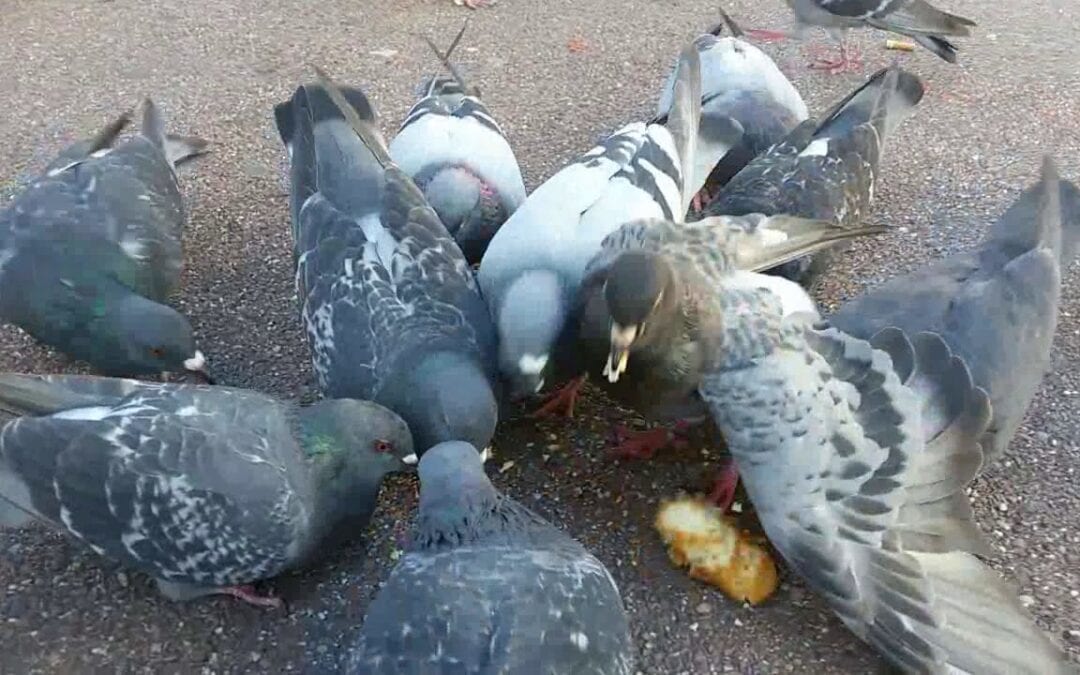
by Pigeon Patrol | Apr 26, 2023 | history of pigeons, MBCA, pet bird, Pigeon Control, Pigeon Droppings, Pigeon Patrol's Services, Pigeon Predators
Pigeons like to land, roost, nest, and make a mess of your roof and they’re not easy to get rid of. Persistence, bird deterrents, and bird exclusion is the key.
Get rid of pigeons on the roof by removing food and water
Remove all food and water sources and never feed the pigeons! In addition, don’t let your neighbors feed the pigeons. The pigeons can eat at your neighbors and nest on your roof!
Pigeons mainly like to eat seeds and grains such as oats, wheat, corn, cereal, sorghum, rice, beans, barley, millet, peas, and sunflower. They also like to eat food scraps left behind by people, including bread crumbs and popcorn. Birdseed is their favorite because it contains a variety of seeds and grains.
When grains or seeds aren’t available pigeons will eat fruit, greens, and occasionally insects, earthworms, and snails. They especially like apples, grapes, berries, lettuce, spinach, and sprouted seeds.
Pigeons need a constant water source. If water isn’t readily available they will leave to find a more suitable place to live. They can find water in birdbaths, gutters, pools, decorative water fountains, puddles, ponds, streams, and even leaves after a rain storm.
Easy to use deterrents to get rid of pigeons on the roof
Aluminum foil, bird deterrent tape, shiny Mylar balloons, wind propelled shiny spinning objects, and plastic decoy scare owls are scary objects to pigeons. Place scary objects on the roof, under the eves, or on the patio. Pigeons don’t like or feel comfortable with scary objects next to their nesting area. They would rather live in a more peaceful environment. One thing to remember, when installing scary objects, is to move them around on a regular basis. Objects that stay in one position don’t scare pigeons.
Wind chimes may deter pigeons. You can give it a try. Pigeons have sensitive hearing and the noise from wind chimes can actually hurt their ears. Pigeons don’t particularly like to nest where loud noises come and go.
Sticky bird gel can also deter pigeons. Apply the sticky gel to your roof where the pigeons are landing and roosting. The gel will make the area uncomfortable for the pigeons to roost.
Metal bird spikes to get rid of pigeons on the roof
Metal anti bird perching spikes can be effective in the right circumstance. They can work pretty well depending on the location you put them. Install them on rooftop edges, ledges, chimneys, and anywhere you see the pigeons land, roost, or nest. Metal bird spikes are mostly maintenance free and can be a permanent solution to deter pigeons from your roof.
Metal anti-perching spikes are harder to install and are not aesthetically appealing.
Wire screens or mesh to get rid of pigeons on the roof
Exclusion is the best solution to pigeon problems in alcoves, around chimneys, under solar panels, on vents, and many other places on the roof. Exclusion with wire bird screen and mesh do offer a permanent solution to pigeon nesting problems.
Solar panels are generally raised 5-12 inches above shingled or tiled roofs, thus creating a void between the panel and the roof. Pigeons can easily go underneath the panel to nest, poop, and make a noticeable and destructive mess. Most, if not all, rooftops that have solar panels need to have pigeons excluded from getting under the solar panels.
Installing wire bird screens or mesh can be difficult and hazardous. It requires being on the roof with tools, a lot of bending over (which is physically demanding), cutting the wire to the proper dimensions, and stapling or screwing on the wire. It is not advised for a home or business owner to install wire screens or mesh because it isn’t safe. You can fall off the roof and get seriously injured or die. To use this method, please hire a professional bird control company.

Bird netting to get rid of pigeons on the roof
If your roof is large and flat, bird netting is an excellent method to use to keep pigeons off your roof. It physically blocks the birds from the roof. If the birds can’t get on the roof, they can’t roost or nest. Bird netting is an exclusion method primarily used for large commercial bird and pigeon control.
A professional bird control operator should install bird netting. If not installed correctly the pigeons can still land on the area and get trapped, as well as other birds. This is cruel. Please hire a professional bird control company for bird netting. It will cost money but it is the safest and most humane way to have bird netting installed.
Remove bird nesting materials and droppings
It is important to remove all pigeon nesting and feces prior to excluding pigeons. Nesting materials and droppings left on the roof will continue to cause damage.
If the roof has a pitch, using a power washer is generally the best way to get rid of pigeon waste. Put a tarp on the ground next to the roof to catch the debris as it is rinsed off the roof. It will be much easier to clean up the pigeon feces on the ground if it is contained on a tarp. Wear a mask to prevent inhaling fumes from pigeon feces and wet the feces down before rinsing off. Histoplasmosis is zoonotic disease that can be found in pigeon feces. Zoonotic diseases are caused by harmful germs like viruses, bacteria, parasites, and fungi that are spread between animals and people.
If the roof is flat, you will have to wet the roof down (to prevent spreading contaminants and disease through the air), then rake and sweep up the pigeon waste prior to rinsing. Again, wear a mask to prevent inhaling fumes from pigeon feces.
Please be careful or better yet, call a professional. Using a power washer on the roof can be slippery and dangerous. Inhaling noxious pigeon feces can cause disease – it is a biohazard.
Importance of discouraging pigeons from nesting on your roof
Pigeons spread disease. There are over 60 diseases birds and their droppings can carry. Some of the diseases from pigeon droppings include salmonella, toxoplasmosis, cryptococcosis, St Louis encephalitis, E.coli, and more. In addition, fungus can grow in pigeon droppings which can cause histoplasmosis. Histoplasmosis is a respiratory disease that may be fatal. Pigeons are also carriers of pests including fleas, mites, ticks, and lice as well as West Nile virus. All of these diseases can pose a serious threat to human health.
Property damage is a big concern with pigeon nesting and droppings. Nests can clog gutters, ventilation pipes, chimneys, and damage electrical equipment. Damaged electrical wires from pigeon nests can even lead to fires. Pigeon droppings are very acidic. The droppings can actually eat away at the roof structure and cause roof leakage.
Pigeon droppings are unsightly. Nobody likes to see or walk on pigeon droppings.
People can slip and fall where pigeon droppings accumulate. When pigeon feces are fresh or rained on it is slippery.
Call a professional
Installing wire bird spikes, wire screens, wire mesh, or bird netting is difficult and hazardous. People can, and do, fall off roofs. People who fall off roofs get seriously injured and even die. It is best to call a professional bird control company when using these methods. Companies that specialize in removing and excluding bird pests (like pigeons) have the know how and safety equipment to get rid of pigeons in a safe and efficient manner from rooftops, alcoves, solar panels, chimneys, window sills, and other areas.
Source
Pigeon Patrol Products & Services is the leading manufacturer and distributor or bird deterrent (control) products in Canada. Pigeon Patrol products have solved pest bird problems in industrial, commercial, and residential settings since 2000, by using safe and humane bird
deterrents with only bird and animal friendly solutions. At Pigeon Patrol, we manufacture and offer a variety of bird deterrents, ranging from Ultra-flex Bird Spikes with UV protection, Bird Netting, 4-S Bird Gel and the best Ultrasonic and audible sound devices on the market today.
Voted Best Canadian wholesaler for Bird Deterrent products ten years in a row.
Contact us at 1 877-4-NO-BIRD,(604) 585-9279 or visit our website at www.pigeonpatrol.ca
Pigeon/Pigeon Patrol / Pigeons Roosing / Vancouver Pigeon Control / Bird Spikes / Bird Control / Bird Deterrent / PIgeon Deterrent / Surrey Pigeon Control / Pest / Seagull deterrent / Vancouver Pigeon Blog / Birds Inside Home / Pigeons in the cities / Ice Pigeons / What to do about pigeons / sparrows, Damage by Sparrows, How to Keep Raccoons Away, Why Are Raccoons Considered Pests / De-fence / Pigeon Nesting / Bird Droppings / Pigeon Dropping / woodpecker control / Professional Bird Control Company / Keep The Birds Away / Birds/rats/seagull/pigeon/woodpecker/dove/sparrow/pidgeon control/pidgeon problem/pidgeon control/flying rats/pigeon problems/ bird netting/bird gel/bird spray/bird nails/bird guard
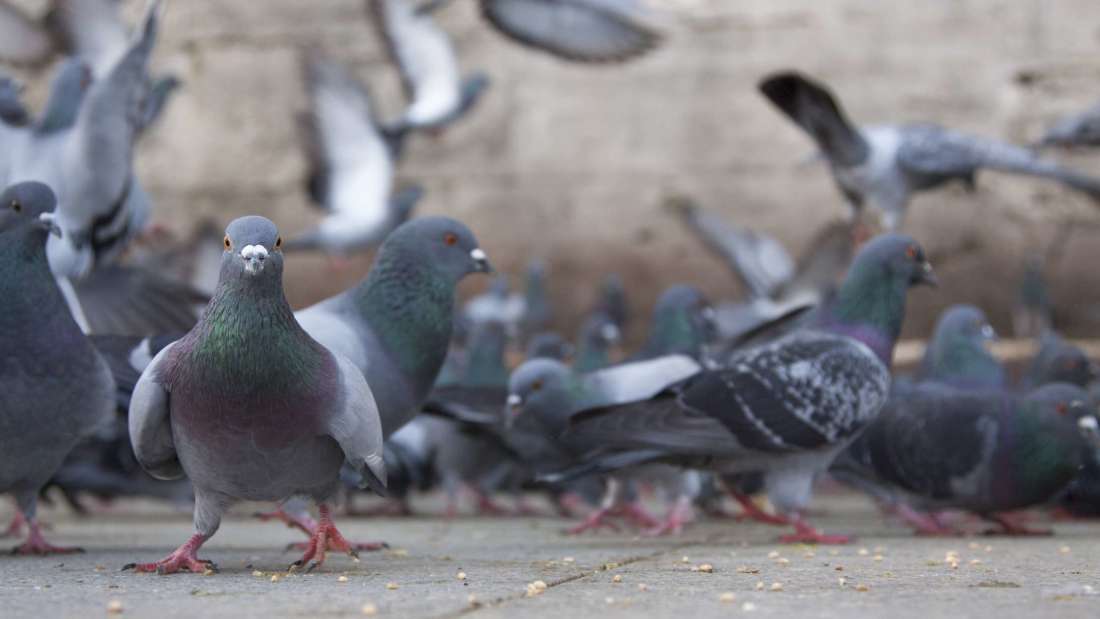
by Pigeon Patrol | Apr 18, 2023 | history of pigeons, MBCA, pet bird, Pigeon Control, Pigeon Droppings, Pigeon Patrol's Services, Pigeon Predators
When travelling in groups, animals frequently have to make decisions on the direction of travel. These decisions can be based on consensus, when all individuals take part in the decision (i.e. democratic decision; social information), or leadership, when one member or a minority of members make the decision (i.e. despotic decision; personal information). Here we investigated whether decision-making on the navigation of small flocks is based on democratic or despotic decisions. Using individual and flock releases as the experimental approach, we compared the homing performances of homing pigeons that fly singly and in groups of three. Our findings show that although small groups were either governed (i.e. when individuals in the flock had age differences) or not (i.e. when individuals in the flock had the same age) by leaders, with concern to decision-making they were all ruled by democratic decisions. Moreover, the individual homing performances were not associated with leadership. Because true leaders did not assume right away the front position in the flock, we suggest that as in human groups, starting from a central position is more effective as it allows leaders to not only transmit their own information but also to average the tendencies of the other group members. Together, the results highlight the importance of democratic decisions in group decision-making.
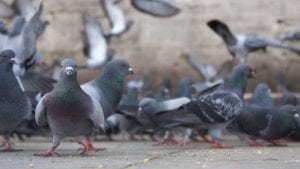
Source
Pigeon Patrol Products & Services is the leading manufacturer and distributor or bird deterrent (control) products in Canada. Pigeon Patrol products have solved pest bird problems in industrial, commercial, and residential settings since 2000, by using safe and humane bird
deterrents with only bird and animal friendly solutions. At Pigeon Patrol, we manufacture and offer a variety of bird deterrents, ranging from Ultra-flex Bird Spikes with UV protection, Bird Netting, 4-S Bird Gel and the best Ultrasonic and audible sound devices on the market today.
Voted Best Canadian wholesaler for Bird Deterrent products ten years in a row.
Contact us at 1 877-4-NO-BIRD,(604) 585-9279 or visit our website at www.pigeonpatrol.ca
Pigeon/Pigeon Patrol / Pigeons Roosing / Vancouver Pigeon Control / Bird Spikes / Bird Control / Bird Deterrent / PIgeon Deterrent / Surrey Pigeon Control / Pest / Seagull deterrent / Vancouver Pigeon Blog / Birds Inside Home / Pigeons in the cities / Ice Pigeons / What to do about pigeons / sparrows, Damage by Sparrows, How to Keep Raccoons Away, Why Are Raccoons Considered Pests / De-fence / Pigeon Nesting / Bird Droppings / Pigeon Dropping / woodpecker control / Professional Bird Control Company / Keep The Birds Away / Birds/rats/seagull/pigeon/woodpecker/dove/sparrow/pidgeon control/pidgeon problem/pidgeon control/flying rats/pigeon problems/ bird netting/bird gel/bird spray/bird nails/bird guard








